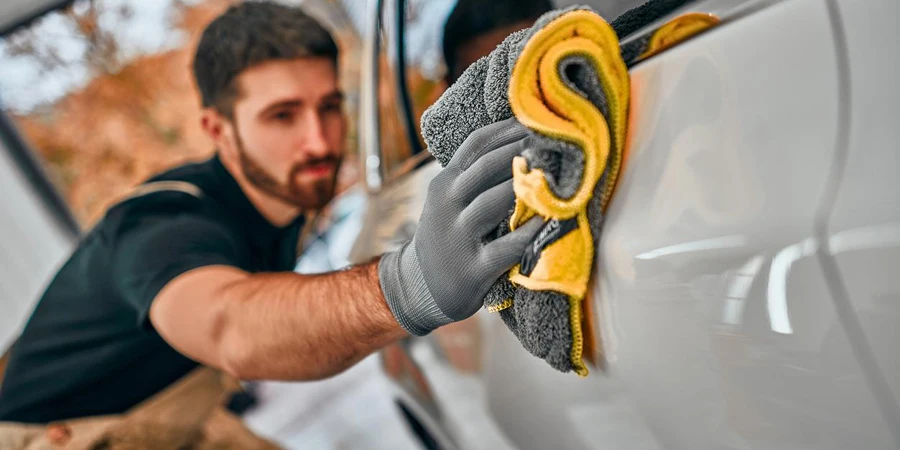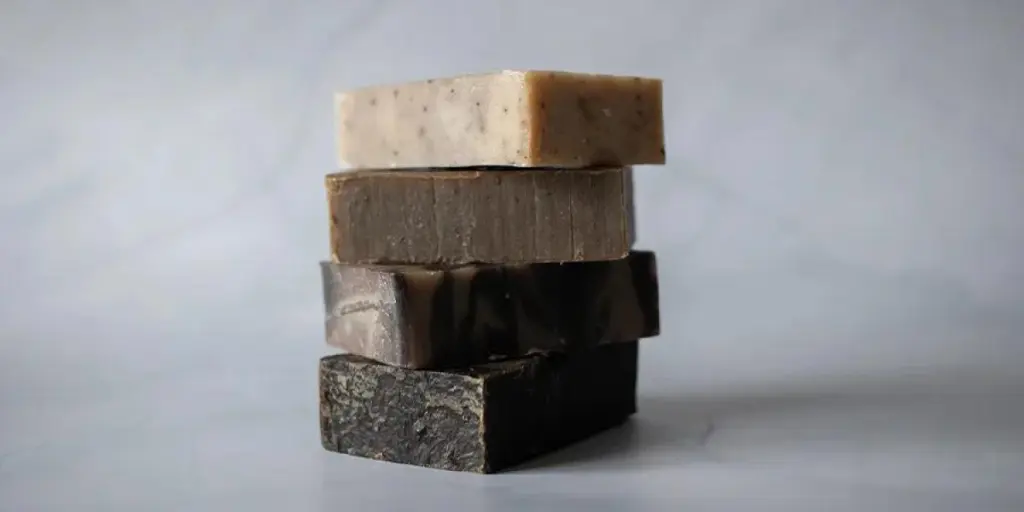In the rapidly evolving automotive care market, the choice of car towel plays a pivotal role in ensuring the longevity and aesthetic appeal of vehicles. These towels, crucial for effective maintenance and detailing, range from plush microfibers to durable synthetics, each designed to offer superior cleaning without compromising the vehicle’s surface. Selecting the right car towel not only enhances the detailing process but also supports sustainable practices by reducing the need for chemical cleaners and frequent replacements. This guide highlights the various types of car towels available, their specific applications, and the latest innovations shaping their development in 2024.
Table of Contents
1. Decoding car towel types and their uses
2. Market dynamics and consumer insights for car towels
3. Essential selection criteria for premium car towels
4. Spotlight on 2024’s top car towel models
Decoding car towel types and their uses
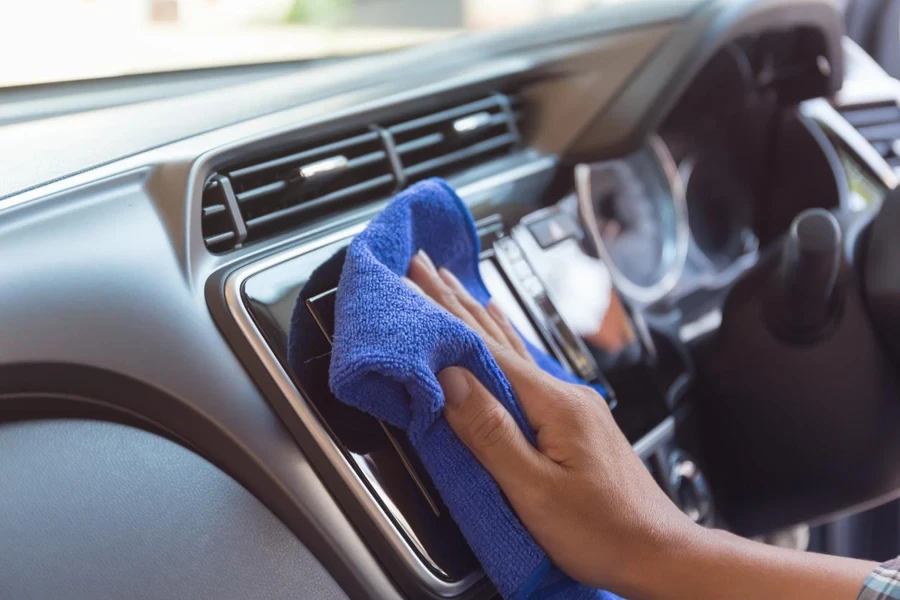
Car towels play an indispensable role in automotive maintenance, providing the first line of defense against micro-scratches and ensuring a flawless finish. Understanding the spectrum of towel types available is essential for professionals looking to maintain a high standard of car care.
Exploring the spectrum: microfiber, cotton, and synthetics. Microfiber towels, known for their fine threads and softness, offer superior dirt-trapping capabilities. The construction of microfiber is crucial for its effectiveness. Typically, microfiber combines polyester for durability and polyamide for absorbency, creating a blend that can absorb many times its weight in water. These towels come in various weaves and GSM (grams per square meter), influencing their function. For example, a higher GSM rating often indicates a denser towel, which is more absorbent and suitable for drying large surfaces without causing scratches.
Cotton towels, while traditional, offer a different kind of utility. Their rugged texture and high absorbency make them suitable for jobs where a more abrasive touch is needed, like polishing chrome or cleaning dirt-encrusted wheels. However, they are generally less preferred for paint jobs as they tend to leave lint and are not as soft as microfiber.
Synthetic blends are also common in car care. These towels may include materials like polyester alone or in combination with other synthetics to enhance specific characteristics like durability and drying speed. Synthetics are particularly valued for their ability to dry quickly and resist mold and odors, making them ideal for frequently used car cleaning kits.
Tailored towels for every task: uses across different applications. Each type of car towel serves a distinct purpose based on its material properties. For example, waffle weave microfiber towels are excellent for drying because their texture allows them to absorb large amounts of water quickly and efficiently. This makes them ideal for use after a car wash to prevent water spots on the vehicle’s surface.
For detailing, plush high-pile microfiber towels are often used because they are gentle on paint and excellent for applying waxes and sealants without risking scratches. Their thick pile helps distribute products evenly while pulling dirt away from the surface, minimizing the risk of damage.
Low-pile towels, with their minimal fiber length, are more suited for removing heavy wax residues or for interior detailing where precision is necessary. They offer less risk of snagging on rough edges but still provide enough surface area to effectively clean and polish.
Market dynamics and consumer insights for car towels
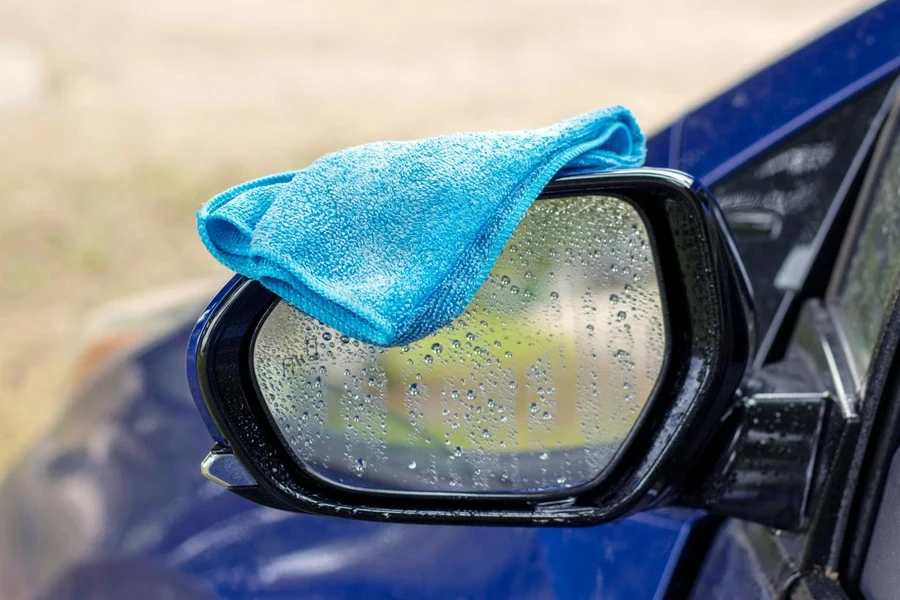
The car towel market in 2024 is being shaped by a series of innovations and evolving consumer preferences, reflecting broader trends in eco-friendliness, technological advancement, and cost-efficiency.
Innovations steering the car towel market in 2024: Recent innovations in the car towel market have significantly influenced the materials and designs used in manufacturing. The introduction of nano-fiber technologies and improved microfiber blends has enhanced the cleaning efficiency and durability of car towels. These advancements not only cater to the demand for high-performance products but also align with the increasing environmental consciousness among consumers, who now prefer products that offer sustainability without compromising on quality.
Additionally, the integration of antibacterial treatments in towel fabrics is becoming more common, addressing hygiene concerns that have grown in prominence. This feature is particularly appealing in a market that values cleanliness and sanitation, further driven by global health awareness trends.
Consumer buying behaviors and preference patterns: Understanding consumer buying behaviors in 2024 reveals a marked preference for cost-effective yet high-quality solutions. Economic fluctuations and a heightened consumer awareness about spending have led to a more discerning market, where value for money becomes a critical purchase driver. Consumers are increasingly looking for products that promise longevity and efficiency, prompting companies to innovate competitively priced options without sacrificing quality.
Social media platforms and online reviews continue to influence consumer preferences significantly. The ease of access to product reviews and the rising trend of video demonstrations on platforms like YouTube and TikTok play a pivotal role in shaping consumer decisions. These platforms are not only used for entertainment but are becoming crucial in the consumer research phase, offering a space for brands to engage directly with potential buyers through interactive content and real-time feedback.
These dynamics illustrate a complex interaction between technological innovations and consumer expectations, where both elements drive the car towel market towards more sophisticated and consumer-friendly offerings. Understanding these trends is essential for businesses aiming to stay relevant and competitive in this evolving landscape.
Essential selection criteria for premium car towels
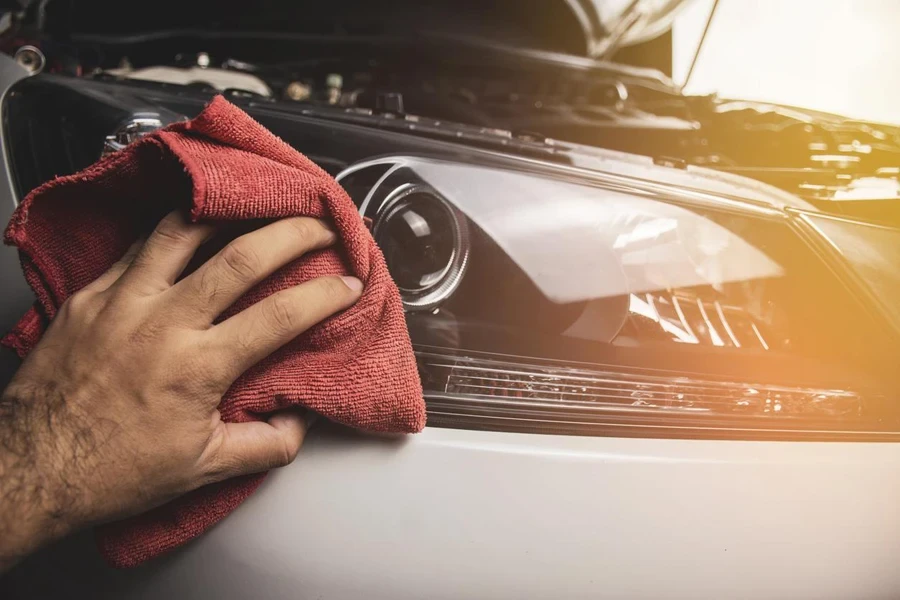
Selecting the right car towel is a critical decision for professionals seeking to uphold a high standard of auto care. This choice impacts not only the efficacy of cleaning and detailing processes but also the longevity and preservation of a vehicle’s finish. Below are key considerations that can guide this selection process.
Weighing quality with GSM metrics: GSM, or grams per square meter, serves as a primary indicator of a towel’s quality. It quantifies the density of the fabric, impacting the towel’s absorbency, durability, and softness. High-quality car towels typically range from 300 to 900 GSM. Towels on the higher end of this spectrum (around 700 to 900 GSM) are particularly plush and absorbent, ideal for drying large surfaces without leaving streaks or scratches. For example, premium microfiber towels used in auto detailing might boast a GSM of up to 900, ensuring they are sufficiently dense to absorb large amounts of water and trap dirt without abrasion to the paint. Conversely, towels with a lower GSM (300-400) are lighter and faster drying, suitable for interior detailing where less water absorption is required.
Weave wonders: choosing the right type for optimal results. The weave of a towel affects its texture and functional qualities. Different weave patterns serve specific purposes:
- Waffle weave towels are excellent for drying because their unique structure allows for high absorbency and quick drying. They are particularly effective at minimizing streaks on glass and glossy surfaces.
- Plush or dual-pile towels feature long fibers on one side and shorter ones on the other, offering versatility in cleaning and polishing. The long fibers can be used for applying waxes or quick detailing sprays, while the short side is better suited for removing heavier residues like polishes or compounds.
- Twist loop microfiber towels are highly absorbent and gentle, making them ideal for drying without causing swirls or scratches. These towels, like the Adam’s Polishes Jumbo Plush Drying Towel, can hold significant amounts of water, which is crucial when working on large vehicles to reduce the number of times the towel needs to be wrung out.
Green choices in car towel manufacturing: With a growing emphasis on sustainability, selecting eco-friendly car towels is becoming more important. Towels made from recycled materials or produced using environmentally friendly processes are increasingly available. These towels not only help reduce the environmental impact but also cater to consumers who prioritize green products. For instance, towels manufactured with organic fibers and water-efficient processes or those certified by environmental standards (like OEKO-TEX or Green Seal) ensure that the product is created with minimal ecological footprint. Additionally, features like biodegradable fibers and non-toxic dyes play a significant role in enhancing the environmental appeal of car towels.
Spotlight on 2024’s top car towel models
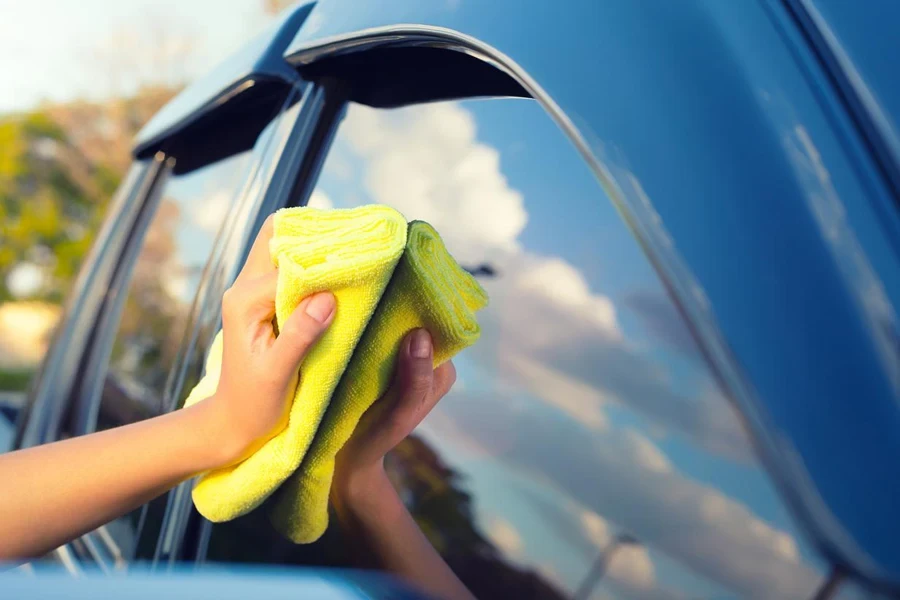
The market for car towels continues to evolve, with microfiber towels leading the charge due to their superior qualities. Here, we spotlight some of the top models of 2024, focusing on their performance across various metrics such as durability, absorbency, and value.
Benchmarking the best: microfiber towels leading the charge. Microfiber towels remain at the forefront of car care technology due to their ability to trap dirt and absorb liquids efficiently without scratching the vehicle’s surface. In 2024, brands like AIDEA, Chemical Guys, and The Rag Company are highlighted for their top-tier products. For instance, The Rag Company’s Liquid8r Towel features an advanced weave pattern that enhances its absorbency and softness, making it ideal for delicate detailing tasks. This towel, along with others from leading brands, represents the pinnacle in balancing performance and gentle care for car finishes.
From economical to elite: covering the full spectrum. The car towel market in 2024 offers options that cater to all needs and budgets. At the economical end of the spectrum, products like the AIDEA Car Cleaning Cloth provide value with decent performance for everyday cleaning tasks. These are often sold in bulk and are suitable for less critical applications where high performance is not the primary concern. On the elite end, towels like ExoForma’s Mega Car Drying Towel feature ultra-high GSM (1200 GSM), which offers unparalleled absorbency and plushness, ideal for drying without leaving any marks or scratches.
Durability and absorbency: what sets the best apart. Durability and absorbency are critical factors that set premium towels apart from their competitors. High-quality microfiber towels, such as those from Chemical Guys and MR.SIGA, often feature blends that optimize both durability and absorbency, making them last longer and perform better. For instance, MR.SIGA’s Premium Microfiber Towels are designed to withstand multiple washes without losing their absorbent qualities, which is essential for maintaining performance over time. These towels are made from a blend that includes a higher ratio of polyamide, which enhances their softness and absorbency — crucial for protecting a car’s finish during repeated uses.
Conclusion
The selection of car towels in 2024 underscores a dynamic shift towards advanced materials and eco-friendly manufacturing processes, reflecting the industry’s adaptation to both environmental concerns and consumer demands for high performance. As microfiber technology continues to dominate due to its superior qualities, professionals and retailers must prioritize both sustainability and efficiency in their offerings. This evolution not only ensures better care for vehicles but also aligns with broader market trends favoring responsible consumption and innovation in automotive care products.
